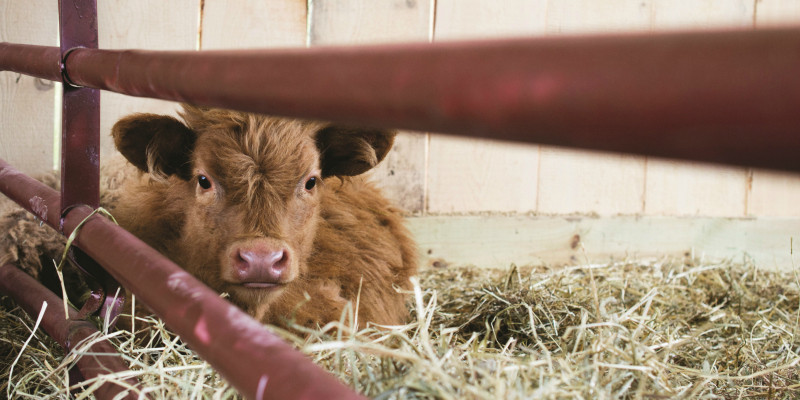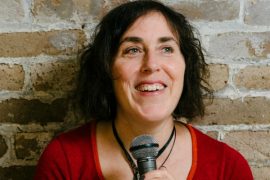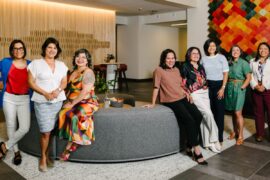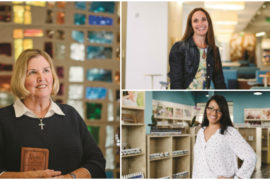How Brit and Matt McCoy fulfilled their farm-based dreams
By Meg Rothstein | Photos courtesy Homestead Wisconsin
It wasn’t long after the young Iowa State University graduates settled on a quiet street in the city of Evansville, Wisconsin, that Brit McCoy turned to her new husband, Matt, and asked, “Hey, Babe. How long do I have to wait to get my cows?”
Despite its timing, Brit’s question wasn’t a surprise to Matt, even in light of their city dwelling. She had a dream in need of tending. Though neither had parents who were farmers, Brit grew up on a country estate in southern Wisconsin across the road from a herd. Matt felt at home in the country and Brit was mesmerized by everything cattle. (She even toyed with the idea of agriculture as her focus in college.) The young designers spent hours driving through the countryside together, with Brit imagining aloud how they’d find their country home and she’d one day create a farm-based infusion of her passions: landscape design, floral arrangement and cows.
A bit of backstory: The McCoys both chose landscape architecture and design paths at Iowa State. Brit got her first job in the landscape industry at age 14 and has worked in design ever since. Matt works as a sawyer full time for The Wood Cycle of Wisconsin, Brit’s family’s urban wood business. Floral design seemed like the perfect complement to their growing landscape design business. Initially, Brit designed for her own wedding and those of family and friends.
“Floral arrangement became my passion project that went out of control. Everyone was married and I realized—I’m not done with this yet. This is too much fun!” Brit researched area cutting gardens, speaking with sellers at farmers markets. She purchases her blooms from Fair Field Flowers, a cooperative, local flower farms partnership.
Back to the cows: Brit followed up her question with a solid business proposal. Matt always knew his designer wife was also the unapologetic lifelong “cattle nerd” and food consumer knowledge enthusiast who believes in the importance of people knowing exactly what they’re eating. Brit’s keen proposal to merge her landscape and floral design businesses with a new, honest, small, grass-fed meats enterprise was a clear winner. Homestead Wisconsin, LLC was on the horizon. Brit’s cows would soon come home.
The couple looked for farmland in their favorite Driftless Region. Concurrently, Brit’s family agreed to allow the couple to clear and fence acreage at their property near Oregon. There, Brit began raising a couple of beef cattle to start, with the plan of raising for family and friends while learning her trade. That important year of literal field work helped Brit gain her footing. She thought through questions such as how many head she should raise and whether to do rotational grazing. Raising grass-fed beef cattle always seemed an appropriate decision for Brit, with her sustainability background. An animal lover, she wanted to feed her cattle the way they were designed to eat. Grass feeding would raise the animals’ quality of life, she reasoned, and, in turn, the quality of her product.
Brit connected deeply with female farmers (known affectionately as “FarmHers”) via social media. A natural autodidact, she schooled herself using books, webinars, podcasts and networks devoted to farming the docile beasts who’d grazed in her dreams for so long.
In August of 2017, the couple closed on their gorgeous old farm and white farmhouse nestled into the hills just outside Belleville. The property originally caught Matt’s sawyer’s eye with its richly wooded hillsides of walnut, hackberry and oak. The couple was pleased to learn the property is home to what reportedly is Wisconsin’s largest walnut tree. Its majestic silhouette now serves as Homestead’s logo.
The old barn fell and was buried long ago. This past fall, Matt and Brit’s family and friends helped the couple clear land and raise a new barn—all wood, of course, with pine boards milled by Matt and reflecting the couple’s eye to design. Brit met with the U.S. Department of Agriculture to learn about her options as a beginning female farmer. She received a grant to clear and fence 18 additional acres in her lower field. The couple brought their cows home and expanded their herd.
In December, Brit added eight new ewes. She lovingly cares for her “flerd” (flock and herd)—sheep that run on the same system as her cattle and bring grass-fed lamb meat and re-cardable wool mattress pads to her growing products catalog of Highland and Hereford beef and leather goods, floral designs and landscape designs. Homestead’s blog brims with news for her customers who get to know their farmer long before Brit herself delivers their meat orders complete with handwritten notes and recipes.
Brit’s threefold dream thrives and makes perfect sense. The family jokes that Brit’s dad left his hog farming childhood to pursue his own dreams, married a woman who wanted nothing to do with farming but then, “Of course, my mom gave birth to a farmer.” Brit grins. “I’m a designer who checked out every cattle book I could find as a little girl. I was born to do this and she knew it.”
Homestead Wisconsin’s buy local values
The daughter of a Wisconsin business owner, Brit McCoy was raised with the value of “buy local” from the start. She’s brought that value with her into her own business and looks for area partnerships to bring unique items to Homestead Wisconsin’s catalog.
Homestead Wisconsin’s floral designs are created and crafted on site from Fair Field Flower blooms grown in the rich soils of South Central Wisconsin’s prairie. Fair Field Flowers is a cooperative consortium of dedicated growers. “I buy my flowers Thursday, design Friday and they’re out the door to the wedding on Saturday,” McCoy says. Their selection is vast and varies constantly, allowing McCoy a floral palette at peak color with which to both create artistically as well as meet her client’s specific style preferences. Each bloom she purchases from Fair Field is sustainably grown, hand selected and cut at its prime. McCoy prizes her relationship with Fair Field Flowers and the fact that her clients get only the freshest works of art from Homestead’s table.
The recent introduction of sheep to Homestead Wisconsin brought about another new local relationship between businesses. McCoy harvests the wool of her flock and sends it to Courtney Woolen Mill near Appleton. There, the over 100-year-old mill expertly cleans, cards and transforms Homestead’s wool into comfortable, moisture wicking all-wool mattress pads. The mattress pads keep customers cool in the summer and warm in the winter while they count sheep.
They’re also a perfect fit for McCoy’s sustainability values. When the mattress pads wear down (an average first lifespan is about five years), Brit encourages her customers to return their pads to her, as she can have the mattress pads re-carded and returned good as new—and with a discount perk.




